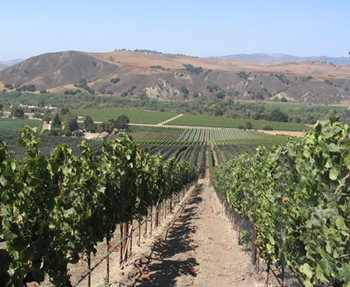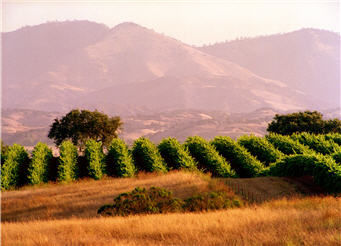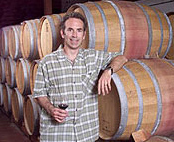

Gainey is the only vintner to actually own and farm vineyards in both the warmer Santa Ynez Valley and the cooler Sta. Rita Hills (pictured here).
Gainey Vineyard
Runs Hot and Cold*
*Vineyards, that is.
Expanding from their original, warm climate Santa Ynez Valley vineyard, Gainey is now enjoying success with its cool climate Sta. Rita Hills Pinot Noir/Chardonnay plantings.
by
Dennis Schaefer
January 26, 2009
Appellation America: As a North Coast expatriate, can you contrast and compare Santa Ynez Valley to Napa and Sonoma?
Kirby Anderson (KA): In the Santa Ynez Valley, if one were to equate the Gainey Home Ranch with a familiar climate zone up north, Saint Helena, or perhaps Rutherford, might come the closest. Quite honestly, if I wanted to spend my life in pursuit of making the best or ultimate Cabernet or Merlot in the state, then I should definitely transfer up to Napa Valley. However, that is not my intention. Anyone who knows me knows I would prefer to dabble in many flavors rather than be restricted to one type. Napa Valley tends to lean towards being a monoculture. I get bored easily.
Here, in Santa Ynez, because the region has not yet been identified as the "ultimate place to grow _____” winery owners and vineyard owners are still willing to experiment with grapes from Spain, Southern France (Rhone), and Italy.
AA: What about the weather? Being here on the edge of Southern California, we’re close to being a desert climate.
KA: Lack of rainfall, although not enjoyable to me personally, is a distinct advantage when growing grapes. Of the eleven vintages here at Gainey, only twice has poorly timed rainfall had a negative effect on the vintage. The daytime high temperatures do creep into the triple digits frequently during the growing season, but they are significantly offset by the lows. It is not unusual to see 40, and sometimes 50 degree swings. These cool night time temps help preserve natural acidity.
Take, for example, Merlot. It is not uncommon to experience 25-26° Brix fruit with pHs in the 3.4 – 3.5 range. Not common, and I think this acidity contributes to the production of interesting, vibrant, unique interpretations of the variety. It’s not my quote, but feedback from wine buyers is that Gainey Merlot has a more European feel than many wines do from the North Coast. Is that terroir or winemaking?
AA:: But Santa Ynez Valley is not necessarily uniform in terms of terroir?
KA: The dynamic Brix/pH relationship begins to change as one travels eastward (warmer) in Santa Ynez Valley out to Happy Canyon. The fruit I have worked with out there has significantly higher pHs. Some winemakers might say: "Just add acid". And I do, but the fruit is not arriving at the winery in a balanced state. We have a lot to learn about the Happy Canyon sub-appellation.
In the Ballard Canyon corridor of Santa Ynez Valley, some of the county’s best Syrah is being grown. With one or two notable exceptions, classic Bordeaux reds do not excel there. They must be coddled and cajoled, and the crop must be severely restricted. A grape grower, as opposed to a winegrower, would have a tough time paying the bills if Cabernet Sauvignon was his predominant variety. In fact, many blocks of Cabernet Franc, Cabernet Sauvignon, and Merlot have been ripped out or grafted over in the last couple years. Conversely, Gainey is planting Cabernet Sauvignon and will probably plant more Merlot in the future.
AA: I’ve seen the new high density Cabernet Sauvignon plantings at the Home Ranch. Isn’t planting Cabernet in modern day Santa Barbara County counterintuitive?
KA: We do know the Home Ranch (or region?) can produce complex, ripe (not green) Merlot. Can it also produce a Meritage? Gainey's
Gainey is gambling on a ten-acre planting of Cabernet Sauvignon to make great strides at its Home Ranch in Santa Ynez Valley.original Cabernet Sauvignon block, planted in 1983 on its own roots, has never produced a wine under my tenure with enough interest to stand on its own. That being said, Gainey just developed a new 10 acre block of Cabernet Sauvignon. A $250k gamble? A gamble for sure. Farming always has its risks, but we believe that there are some vineyards in Happy Canyon and Ballard Canyon producing ripe, potentially delicious and long-lived red wines.
Our knowledge of how to grow grapes in Santa Ynez Valley in 2006 is far greater than in 1983, and there is a lot more plant material to chose from. It may be a risk, but not a wild bet.
The other mystery is why doesn't the region produce really fine Cabernet Franc? There are still a few diehards who produce interesting wines, but the region as a whole - which thought at one time Cabernet Franc was going to be Santa Barbara's Cabernet Sauvignon - has largely given up on the variety. Gainey produces one, but its production is limited to fewer than 1000 cases and is not released to wholesale.
AA: One of the attractions that brought you to Gainey was their purchase of a ranch in a prime grape growing spot of Sta. Rita Hills. Can you elaborate on that?
KA: The Gaineys’ property on Santa Rosa Road is named Evans Ranch. Given that I had spent a fair amount of previous effort locating myself in the middle of the Russian River Valley to make Pinot Noir, transferring to premium Merlot country was not high on my list. When Dan Gainey drove me out to the Evans property, I was hooked.
Not only were the Gaineys now in the estate Pinot game, they planted four clones of Syrah in a Region 1 climate. Here was a true opportunity to craft and create something new and original – not just take over the reins and maintain the style of some other established, talented winemaker. Although Sanford had a tremendous track record, few other entities were making a go of it out west towards Lompoc. The adventure of blazing a trail was very exciting to me.
AA: What about the terroir of Evans Ranch in Sta. Rita Hills?
KA: Evans Ranch, as does much of Sanford, has a northern exposure. This, too, is and was attractive to me. I am always in pursuit of a means by which to slow down the accumulation of sugar, and somewhere inside I thought this might help. Has it? I don't know yet. These days, in order to be commercially successful, the pressure to make gigantic Pinots, with screaming alcohol levels, is so prevalent that I too am picking fruit riper than I prefer. But, at Evans Ranch, really, it's the wind. The fog too, but it's the wind that helps make Sta. Rita Hills special. Is it terroir or is it the new Dijon clones?
means by which to slow down the accumulation of sugar, and somewhere inside I thought this might help. Has it? I don't know yet. These days, in order to be commercially successful, the pressure to make gigantic Pinots, with screaming alcohol levels, is so prevalent that I too am picking fruit riper than I prefer. But, at Evans Ranch, really, it's the wind. The fog too, but it's the wind that helps make Sta. Rita Hills special. Is it terroir or is it the new Dijon clones?
The Syrahs are dense, dark, higher acid, multi-layered food wines. Coincidentally, Dan Gainey purchased the ranch to have and control his own Chardonnay source. This is fortuitous since Sta. Rita Hills Chardonnay is now scarce, and in some cases, is being grafted over to Pinot! The Chards are lovely. In fact, I make four distinct Chardonnays from the Evans Ranch; the property allows that much diversity. So, is it clonal or winemaking?
AA: I discovered that Gainey is probably the single largest grower of Riesling in Santa Barbara County. What’s that all about?
KA: I had the audacity years ago to suggest to Dan that Riesling be eliminated from the program. He and I have had numerous discussions over the years
Kirby Anderson (KA): In the Santa Ynez Valley, if one were to equate the Gainey Home Ranch with a familiar climate zone up north, Saint Helena, or perhaps Rutherford, might come the closest. Quite honestly, if I wanted to spend my life in pursuit of making the best or ultimate Cabernet or Merlot in the state, then I should definitely transfer up to Napa Valley. However, that is not my intention. Anyone who knows me knows I would prefer to dabble in many flavors rather than be restricted to one type. Napa Valley tends to lean towards being a monoculture. I get bored easily.
Here, in Santa Ynez, because the region has not yet been identified as the "ultimate place to grow _____” winery owners and vineyard owners are still willing to experiment with grapes from Spain, Southern France (Rhone), and Italy.
AA: What about the weather? Being here on the edge of Southern California, we’re close to being a desert climate.
KA: Lack of rainfall, although not enjoyable to me personally, is a distinct advantage when growing grapes. Of the eleven vintages here at Gainey, only twice has poorly timed rainfall had a negative effect on the vintage. The daytime high temperatures do creep into the triple digits frequently during the growing season, but they are significantly offset by the lows. It is not unusual to see 40, and sometimes 50 degree swings. These cool night time temps help preserve natural acidity.
Take, for example, Merlot. It is not uncommon to experience 25-26° Brix fruit with pHs in the 3.4 – 3.5 range. Not common, and I think this acidity contributes to the production of interesting, vibrant, unique interpretations of the variety. It’s not my quote, but feedback from wine buyers is that Gainey Merlot has a more European feel than many wines do from the North Coast. Is that terroir or winemaking?
AA:: But Santa Ynez Valley is not necessarily uniform in terms of terroir?
KA: The dynamic Brix/pH relationship begins to change as one travels eastward (warmer) in Santa Ynez Valley out to Happy Canyon. The fruit I have worked with out there has significantly higher pHs. Some winemakers might say: "Just add acid". And I do, but the fruit is not arriving at the winery in a balanced state. We have a lot to learn about the Happy Canyon sub-appellation.
In the Ballard Canyon corridor of Santa Ynez Valley, some of the county’s best Syrah is being grown. With one or two notable exceptions, classic Bordeaux reds do not excel there. They must be coddled and cajoled, and the crop must be severely restricted. A grape grower, as opposed to a winegrower, would have a tough time paying the bills if Cabernet Sauvignon was his predominant variety. In fact, many blocks of Cabernet Franc, Cabernet Sauvignon, and Merlot have been ripped out or grafted over in the last couple years. Conversely, Gainey is planting Cabernet Sauvignon and will probably plant more Merlot in the future.
AA: I’ve seen the new high density Cabernet Sauvignon plantings at the Home Ranch. Isn’t planting Cabernet in modern day Santa Barbara County counterintuitive?
KA: We do know the Home Ranch (or region?) can produce complex, ripe (not green) Merlot. Can it also produce a Meritage? Gainey's

Gainey is gambling on a ten-acre planting of Cabernet Sauvignon to make great strides at its Home Ranch in Santa Ynez Valley.
Our knowledge of how to grow grapes in Santa Ynez Valley in 2006 is far greater than in 1983, and there is a lot more plant material to chose from. It may be a risk, but not a wild bet.
The other mystery is why doesn't the region produce really fine Cabernet Franc? There are still a few diehards who produce interesting wines, but the region as a whole - which thought at one time Cabernet Franc was going to be Santa Barbara's Cabernet Sauvignon - has largely given up on the variety. Gainey produces one, but its production is limited to fewer than 1000 cases and is not released to wholesale.
AA: One of the attractions that brought you to Gainey was their purchase of a ranch in a prime grape growing spot of Sta. Rita Hills. Can you elaborate on that?
KA: The Gaineys’ property on Santa Rosa Road is named Evans Ranch. Given that I had spent a fair amount of previous effort locating myself in the middle of the Russian River Valley to make Pinot Noir, transferring to premium Merlot country was not high on my list. When Dan Gainey drove me out to the Evans property, I was hooked.
Not only were the Gaineys now in the estate Pinot game, they planted four clones of Syrah in a Region 1 climate. Here was a true opportunity to craft and create something new and original – not just take over the reins and maintain the style of some other established, talented winemaker. Although Sanford had a tremendous track record, few other entities were making a go of it out west towards Lompoc. The adventure of blazing a trail was very exciting to me.
AA: What about the terroir of Evans Ranch in Sta. Rita Hills?
KA: Evans Ranch, as does much of Sanford, has a northern exposure. This, too, is and was attractive to me. I am always in pursuit of a
 means by which to slow down the accumulation of sugar, and somewhere inside I thought this might help. Has it? I don't know yet. These days, in order to be commercially successful, the pressure to make gigantic Pinots, with screaming alcohol levels, is so prevalent that I too am picking fruit riper than I prefer. But, at Evans Ranch, really, it's the wind. The fog too, but it's the wind that helps make Sta. Rita Hills special. Is it terroir or is it the new Dijon clones?
means by which to slow down the accumulation of sugar, and somewhere inside I thought this might help. Has it? I don't know yet. These days, in order to be commercially successful, the pressure to make gigantic Pinots, with screaming alcohol levels, is so prevalent that I too am picking fruit riper than I prefer. But, at Evans Ranch, really, it's the wind. The fog too, but it's the wind that helps make Sta. Rita Hills special. Is it terroir or is it the new Dijon clones? The Syrahs are dense, dark, higher acid, multi-layered food wines. Coincidentally, Dan Gainey purchased the ranch to have and control his own Chardonnay source. This is fortuitous since Sta. Rita Hills Chardonnay is now scarce, and in some cases, is being grafted over to Pinot! The Chards are lovely. In fact, I make four distinct Chardonnays from the Evans Ranch; the property allows that much diversity. So, is it clonal or winemaking?
AA: I discovered that Gainey is probably the single largest grower of Riesling in Santa Barbara County. What’s that all about?
KA: I had the audacity years ago to suggest to Dan that Riesling be eliminated from the program. He and I have had numerous discussions over the years











 READER FEEDBACK: To post your comments on this story,
READER FEEDBACK: To post your comments on this story,





